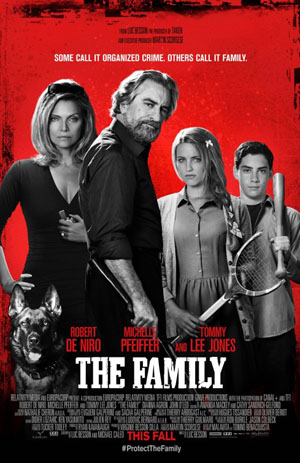 THE FAMILY
THE FAMILY(R)
** (out of 5)
September 13, 2013
STARRING
Robert De Niro as FRED BLAKE
Michelle Pfeiffer as MAGGIE BLAKE
Dianna Agron as BELLE BLAKE
John D’Leo as WARREN BLAKE
Tommy Lee Jones as ROBERT STANSFIELD
Studio: Relativity Media
Directed by: Luc Besson
BY KEVIN CARR
Listen to Kevin’s radio review…
While movies may feel like disposable entertainment for the average audience member, there’s a lot more that goes behind the scenes than most people realize. Even formula movies that fit neatly into a box are subject to a messy development and production circus, taking lots of pain and gnashing of teeth to get a mediocre final product.
The end result of a film like “The Family” is indicative of the sausage factory that is Hollywood because it reeks of overdevelopment that delivers a movie that seems to make less sense than its possible original intentions.
“The Family” is set up with a pretty standard premise. Robert De Niro plays entirely to type as a gangster from New York. He has ratted on his mob family to the Feds, so to keep him safe, his real family goes into witness protection. The latest stop on the ongoing witness relocation train is Normandy, France, where Tommy Lee Jones plays an agent trying to keep the family under wraps so the mob from New York doesn’t find them and whack them.
“The Family” plays as a dark comedy, relying on the jarring fish-out-of-water imagery of a hard-nosed Brooklyn family trying to blend into the small town on the French countryside. This is ripe for some funny scenes, mostly showing the Mafia family beating the tar out of someone that crosses them.
Any of these scenes work well in a very contained sense. More over, the actors involved do a good job with their characters. De Niro doesn’t just phone in his performance, even though he’d be totally able to and justified. Michelle Pfeiffer drops in and out of her accent, but is overall good and still easy on the eyes after all these years.
The stories of the family’s children blow hot and cold. The son (John D’Leo) has a meatier part, showing a wise guy kid who quickly constructs a network of associates to protect him while running every imaginable crime out of his bedroom at home. The daughter (Dianna Agron) plays a nonsensical virginal pretty girl whose muddle teenage feelings are written with the level of understanding of a Mafia hit man.
However, even though any scene chopped out of the movie can be funny as hell, the film just doesn’t hold together. A lot of this falls on the shoulders of a premise that seems to have been overcooked by Hollywood.
Why is this family in France for witness protection and not somewhere in the U.S., like Wichita, Kansas? Why, if they’ve been doing this for so long, do they have such trouble keeping a low profile? Why does it raise no red flags for anyone in this sleepy French town when these obnoxious Americans show up and basically start committing thug crimes? Why, if they’re trying to keep such a low profile, do the Feds insist that the family throw a barbecue and invite the entire town to meet them?
From afar, it seems like this movie was developed to take place in the U.S., but when French action director Luc Besson came aboard, they moved it to France. I can see this angle making the movie different from others out there, but nonsensical different is not preferable to formulaic plots.
There are some high points to the film – like some of the performances, funny scenes and clever nods to De Niro’s career as a gangster icon – but overall, the movie just doesn’t come together as it should.
Podcast: Play in new window | Download

Doesn’t Kevin Carr do any research before he writes and speaks. The screen play is taken from a book titled, “Malavita.” The location of the story is Normandy, France. The book’s author collaborated with Luc Beeson in the writing of the screenplay.
Beeson’s home is in Normandy. His new studio is outside of Paris. “You’re not in Kansas anymore, Dorothy.”
The movie has its shortcomings but this review has more.
Well, thanks for the info. But no, I take a movie on its face value and don’t worry about its source material. I’ve run into this plenty of times before, and I think a movie should stand alone, regardless of where it came from. That’s the feeling I got from it, that it was overdeveloped and shoehorned into the setting. And from this background, it feels like it was shoehorned in the book stage. I just call them as I see them.